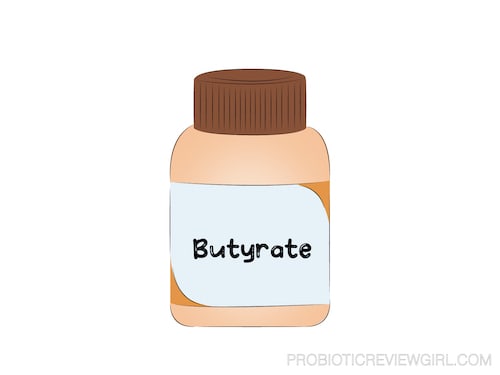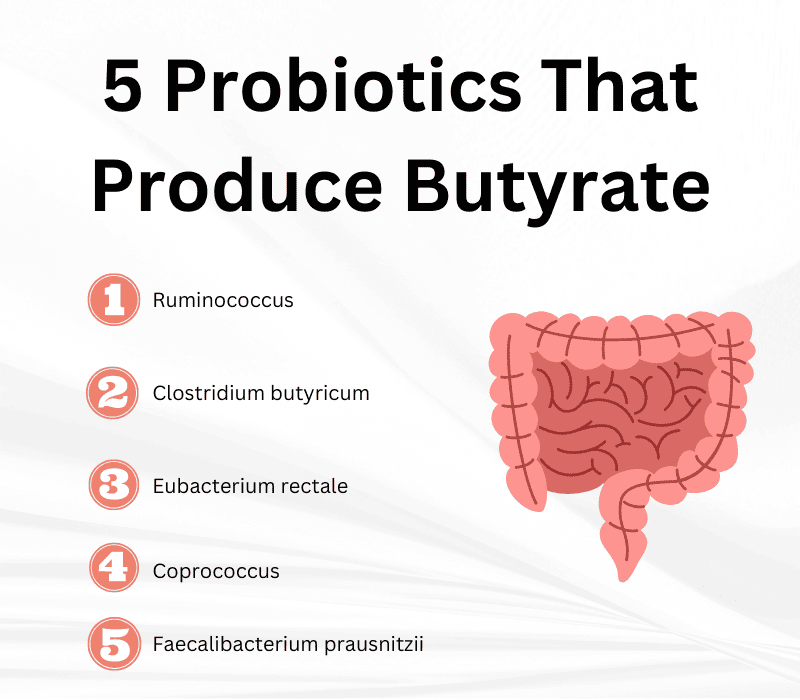Can Probiotics Increase Butyrate?

Butyrate is a short-chain fatty acid that plays a vital role in promoting gut health and has been associated with various physiological benefits in the body. Butyrate can be increased by 5 types of probiotic bacteria according to research.
Probiotics are live microorganisms that, when consumed in adequate amounts, provide health benefits by improving the balance of beneficial bacteria in the gut and supporting overall digestive and immune function.
What Is Butyrate?

Butyrate is a short-chain fatty acid produced in the colon through the fermentation of dietary fiber by gut bacteria. It is considered beneficial for digestive health, inflammation control, and gut microbiome balance. Foods rich in dietary fiber, such as legumes, fruits, nuts, cereals, and whole grains, are good sources of butyrate.
Butyrate regulates fluid transport across the intestinal epithelium, reduces mucosal inflammation and oxidative stress, strengthens the intestinal barrier, and modulates visceral sensitivity and intestinal motility. The mechanisms of action of butyrate are diverse and involve its regulatory effects on gene expression according to a 2011 review authored by RB Canani.
Do Probiotics Produce Butyrate?
Yes, some probiotics produce bacteria that create butyrate-boosting bacteria according to research. Butyrate-producing bacteria, acting as probiotics, play important roles in balancing gut microbiota, maintaining the mucosal barrier, modulating the host immune response, preventing infections, and regulating energy expenditure according to LB Zhu.
What Probiotics Produce Butyrate?

5 types of probiotic bacteria that can produce Butryate include, Ruminococcus, Clostridium, Eubacterium, Coprococcus and Faecalibacterium according to a 2021 review authored by LB Zhu.
- 1Ruminococcus is a genus of butyrate-producing bacteria commonly found in the human gut microbiota that belongs to the Clostridia class. You can increase Ruminococcus by eating more Fibers according to a 2019 study authored by A Tomova.
- 2Clostridium is not typically considered a probiotic as it includes both pathogenic and beneficial strains, but specific strains such as Clostridium butyricum have shown potential therapeutic value in certain clinical applications according to a 2023 study authored by H Xu.
- 3Eubacterium is a genus of bacteria that includes certain strains, such as Eubacterium hallii and Eubacterium rectale which is a butyrate producing bacteria according to a 2020 study authored by H Lu.
- 4Coprococcus is a genus of bacteria commonly found in the human gut microbiota, and certain strains of Coprococcus that can also be increased by eating more plant fibers.
- 5Faecalibacterium is a genus of bacteria that is considered beneficial in the gut microbiota, and Faecalibacterium prausnitzii with Butyrate have been associated with potential anti-inflammatory effects according to a 2020 study authored by M Lenoir.
Is Butyrate A Probiotic?
Butyrate is a short-chain fatty acid and not a probiotic but is produced by some types probiotic bacteria. There is a connection between butyrate and probiotics, that emphasizes the production of butyrate by friendly gut bacteria and its health benefits.
Do Avocados Produce Butyrate?
Avocados can contribute to the production of butyrate in the gut. Avocados are rich in fiber and contain certain bacteria, such as Faecalibacterium, Lachnospira, and Alistipes, which are known to produce short-chain fatty acids, including butyrate according to a 2021 study authored by SV Thompson.
An avocado is a nutritious fruit with a creamy texture, rich in healthy fats, fiber, and various vitamins and minerals.
Do Bananas Produce Butyrate?
Unripe bananas contain resistant starch, which is fermented by bacteria in the large intestine to produce butyrate, a beneficial short-chain fatty acid that supports gut health. Consuming bananas, particularly green ones, is considered beneficial for the production of butyrate in the gut according to a 2020 study authored by T Shinde.
Bananas are a popular fruit known for their sweet taste and high potassium content.
Does Oatmeal Produce Butyrate?
Consuming oat bran increased fecal butyrate concentrations in patients with quiescent ulcerative colitis. This increase in butyrate was associated with prevention of gastrointestinal symptoms and maintenance of subjective health according to a 2020 study authored by M Nyman.
Does Coffee Produce Butyrate?
Daily consumption of coffee or its components, specifically caffeine and chlorogenic acid, increased the plasma concentrations of propionate and butyrate in mice according to a 2018 study authored by K Nishitsuji. The study did not observe significant changes in the gut microbiota composition or the type and quantity of SCFAs in the coffee-treated group.
Coffee is a popular beverage made from roasted coffee beans, known for its stimulating effects due to its high caffeine content, and enjoyed for its rich aroma and distinct flavor.
How To Increase Butyrate In Your Gut?
You can increase butyrate in your gut by increasing dietary fiber intake. Certain foods, particularly those high in fiber, are recommended to boost butyrate levels, including flax and chia seeds, beans and lentils, high-pectin fruits like apples and berries, and vegetables such as garlic and onions.
The emphasis is on consuming a high-fiber diet rich in plant-based foods, as fiber serves as a fuel source for the beneficial bacteria in the gut that produce butyrate. Other suggestions include eating prebiotic-rich and fermented foods, intermittent fasting, improving sleep habits, and considering a fiber supplement.
Dr. Sara Mesilhy has a Master’s degree in Gastroenterology and holds a membership with the Royal College of Physicians of the United Kingdom. She completed her Bachelor of Medicine, Bachelor of Surgery (MBBS) at Cairo University and is currently part of the ProbioticReviewGirl medical team.